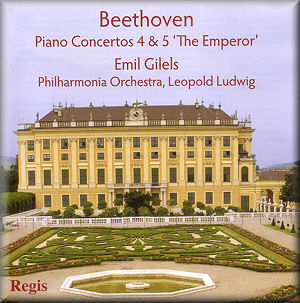 |
 |
|


alternatively
CD: MDT
AmazonUK
AmazonUS
|
Ludwig van BEETHOVEN (1770-1827)
Piano Concerto No. 4 in G major, Op. 58 (1806) [32:56]
Piano Concerto No. 5 in E flat major, Op. 73, “Emperor” (1809) [39:02]
 Emil Gilels (piano)
Emil Gilels (piano)
Philharmonia Orchestra/Leopold Ludwig
rec. No. 1 Studio, Abbey Road, London, 26-27, 30 April, 1 May 1957.
ADD
 REGIS RRC1367 [72:09]
REGIS RRC1367 [72:09] 
|
|
|
These famous performances were issued on the Columbia label
in the late 1950s. No recording details are given with this
disc, nor any information on re-mastering or sources. As far
as I can make out, this identical coupling has already appeared
on EMI’s Great Recordings of the Century series as well
as on Testament. Both those issues would provide the potential
purchaser with a substantial clue that these were period recordings,
but this one doesn’t at all, and that is to be regretted. The
booklet contains only a solid and engaging article on the works
by Hugo Shirley. I have not heard either the EMI or the Testament
transfers.
This a magnificent performance of the G major Concerto
from Gilels, certainly as fine as any I have heard. The pacing
of all three movements is beautifully judged, and the balance
between the dramatic and more romantically reflective moments
is perfectly realised. Honours are equally divided between the
spellbinding soloist and the brilliant Philharmonia of the period
under Leopold Ludwig. There is something remarkable about the
way the pianist really does tame the orchestra in the extraordinary
slow movement. The opening of the finale is so close to a real
pianissimo – as the score demands – and the break between
the movements so perfectly timed that the finale steals in almost
like a continuation of that second movement. It is a remarkable
moment. The playing throughout is of almost Olympian authority
and calm. In short, it’s a must-have. The problem, however,
is the sound. The work begins well enough, though it is quite
obvious that it is a period recording, but as the first movement
progresses the sound deteriorates, bringing back memories of
the old days when distortion, especially around the piano’s
high notes, would have one scurrying to the stylus price lists.
Things improve for the beginning of the slow movement, but again
the sound begins to deteriorate the nearer the listener gets
to what would have been the end of the LP side. In addition,
there are other sundry noises on this “second side”, swishes
and the like, that ominously remind the listener of those “old
days”. To what extent this will discourage listeners depends
on each one’s individual tolerance of this kind of thing. In
my case I wouldn’t now want to be without this performance,
but I’m surprised that it seems not to have been possible to
present it in substantially better sound.
The performance of the Emperor is equally fine. There
is a surprising finger slip from Gilels in the opening flourishes,
but this is nonetheless a stunning reading from a technical
point of view. Listen to the thunderous return of the opening
arpeggios, modified, at the beginning of the first movement
recapitulation (around 12 minutes), and that, after the most
magical of pianissimos. The second movement is taken very slowly,
with a more romantic feel to the phrasing than we would expect
nowadays, and once again the link between this movement and
the finale is achieved with exquisite poise. There is a fair
amount of wonderfully delicate soft playing in the finale, and
as the music gears up to prepare for the end, in the passage
just preceding the piano/timpani duet, Gilels’ playing is delightfully
jaunty. The orchestra plays superbly throughout under Ludwig’s
direction, with the difficult repeated dotted rhythm in the
finale maintained with great success. The balance between piano
and orchestra is exemplary, to the extent that the held horn
notes that accompany the piano at various points in the finale
are clearly audible. The sound in the Emperor is far
superior to that in the G major, with only minimal signs
of end-of-side distortion. Alas, on my copy the stereo channels
are reversed.
William Hedley
see also review by Jonathan
Woolf
|
|












